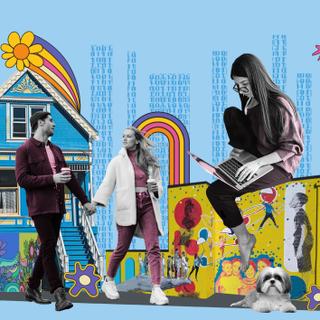


AI start-ups are booming in San Francisco's 'Cerebral Valley'
FeatureA new generation of 'techies' has settled in Hayes Valley, the epicenter of a booming tech world. Here, AI creators are convinced that they are taking part in a 'civilizational change' that in the long term will benefit humanity.
There's a blue house on Lily Street, in San Francisco, California, backing onto a row of banyan trees. The driveway ends in a mural of psychedelic flowers by Italian artist Pepe Gaka. In the urban patchwork that is the city, Hayes Valley is an oasis of tranquility with its trendy boutiques, galleries, pottery studios and cafés serving "artisan" donuts and "botanical" pastries. The neighborhood is a stone's throw from Haight-Ashbury, the flower power capital of the 1970s. The calm is deceptive. Behind the Victorian houses lies a restless world. If the phenomenon of artificial intelligence (AI) is transforming the world of technology, Hayes Valley is the epicenter, with its community hacker houses, where creators share a living and working space. In less than a year, the neighborhood has taken on the nickname "Cerebral Valley." It's a reference "to the brilliant minds who have moved here," said Juliet Kelso, 32, one of the occupants of the blue house.
Today's techies are a far cry from the programmers of the previous generation, the generation of platform expansion. They lived in lofts overlooking the East Bay. They worked "inventing apps to order food," said Gloria Felicia, 28. The AI creators are convinced they are taking part in "the biggest revolution in the history of mankind." At La Boulangerie, the French café that has become a meeting place for hackers and utopians in the heart of Hayes Valley, they are seated, adorned with noise-canceling headphones, beneath a vintage advert for orange flavored soda Orangina. "AI people find inspiration in old houses," said Kelso. "The past meets the future."
'AI will save the world'
Artificial intelligence is the new gold rush. Investors are pouring their money into start-ups, just as they did 10 years ago into social media: $21.4 billion between January and October, according to specialist website PitchBook, compared with $5.1 billion in 2022. To listen to Silicon Valley veterans, the current fever is comparable to the beginnings of the internet, in the late 1990s, with the invention of smartphones, which revolutionized the way computers were used after 2007.
Or to that of the steam engine, as LinkedIn co-founder Reid Hoffman suggested on November 15, at the second AI Summit organized by the Cerebral Valley AI group at Hayes Valley's SFJazz Center. In 2012, influential investor Marc Andreessen heralded the era of digital expansion: "Software is eating the world." In June, the oracle delivered his new mantra: "AI will save the world," he wrote on his blog.
You have 80% of this article left to read. The rest is for subscribers only.
